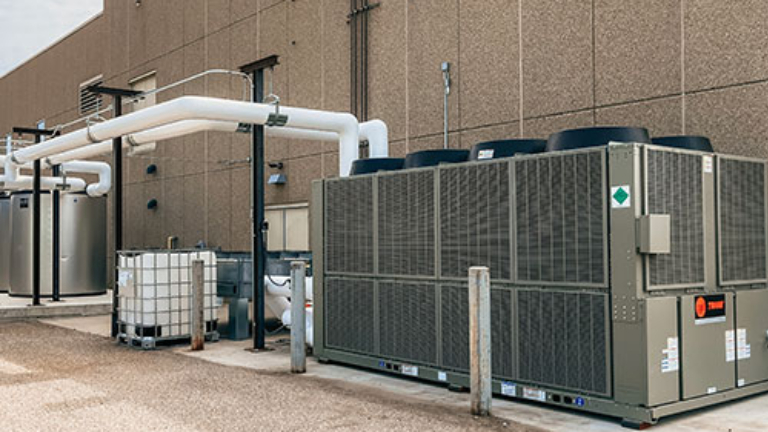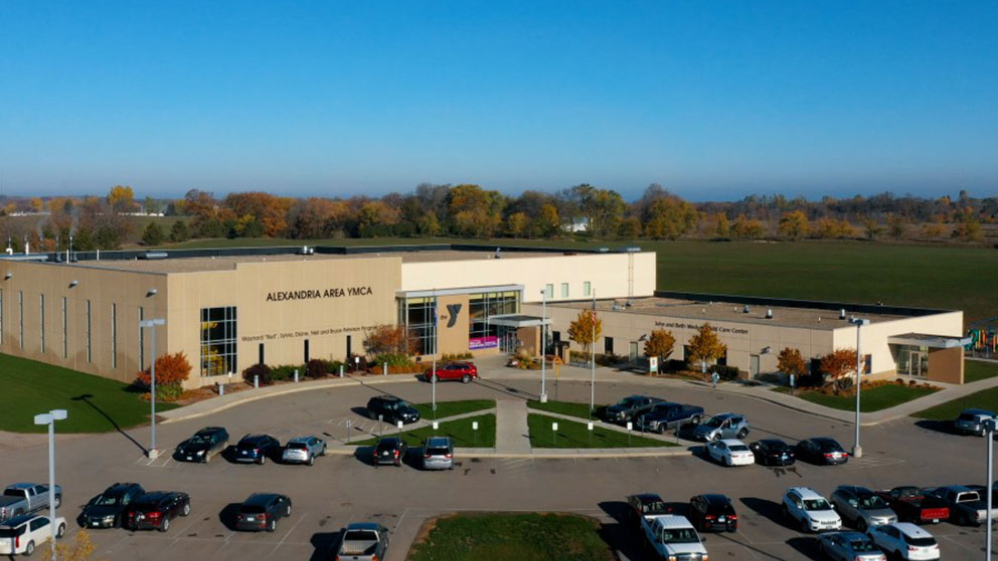Quick Facts
- Industry
- Community Spaces
- Products
- Energy Storage • Chillers
- Topics
- Cost-Saving • Thermal • IEQ
Results
- $6,000 - $7,000 monthly cost savings
- $55,000 one time rebate from ALP utilities
Challenge: Uncomfortable Spaces
Unreliable HVAC systems at the Alexandria Area YMCA were not keeping up with the central Minnesota weather. The YMCA’s workout areas, fitness classes, offices and childcare classrooms were often uncomfortable for members, staff, and most critically, for the young learners enrolled in YMCA Child Care.
“A few mornings a year, our team walked into uncertainty, never knowing if the facility would greet us with a chill at 68 or warmth at 88 degrees,” said Alexandria Area YMCA Executive Director, Jackie Peters. Leaders at the 67,000-square-foot facility wanted to go beyond a simple HVAC system replacement. They wanted a comprehensive long-term plan to help reduce grid dependency, cut rising energy costs, and improve indoor environmental quality (IEQ) while aligning with their sustainability commitments. They also hoped to increase productivity for the facilities team, which was spending up to half a day each week troubleshooting the existing system.

Solution: New Chiller and Thermal Storage Tanks
Pleased with recent work Trane had completed on their building automation system (BAS), YMCA leaders asked Trane to help identify a solution to meet their needs.
After listening carefully, the Trane team recommended a thermal storage solution and controls to help reduce grid dependency and energy costs. The solution included a 100-ton chiller with six thermal storage tanks. The chiller generates ice at night when electricity and cooling loads are lowest, taking advantage of cheaper, low-peak electricity rates.
Turning the chiller off during the day and using stored ice for cooling helps to reduce energy costs. YMCA leaders liked that this solution could accommodate additional thermal storage tanks if the facility is ever expanded. “We appreciated Trane’s patience and support, allowing us the time to delve into the technology, comprehend its Return on Investment (ROI), and reflect on its potential impact”, said Peters.
YMCA leaders valued Trane's collaborative approach throughout the process. Peters highlighted the significance of Trane's information and proposals being presented in layman's terms, coupled with phased approaches—a particularly crucial aspect for nonprofit leaders mindful of conserving valuable financial resources. They would say, “This is what we would strongly recommend as your highest priorities right now. Let's tackle that and then let's move to this,” she said. “And throughout, they continued to support us with preventive maintenance, and willingly showed up at odd times to help us tweak something if it wasn't right.”
Peters valued Trane's candid insights, expressing gratitude for their strategic collaboration. “We appreciate their honesty, recognizing that we don't need to address everything at once,” she said. Specifically, Trane provided transparent guidance on a phased approach to VAV (variable air volume) unit replacement.
Results: Saved Carbon and Time
The new system has optimized IEQ, providing a consistent building temperature and increased peace of mind that all spaces in the facility are comfortable and conducive to the well-being and satisfaction of everyone who uses the facility. It also reduces costs, energy use and the facility’s carbon footprint while doubling the anticipated life expectancy of the previous solutions. The facilities team gained back the half day it was spending each week on keeping the previous system operational. The YMCA has been diligently saving approximately $6,000-$7,000 per month during the summer[KK1] [VK2] , anticipating similar savings during the swing months of spring and fall.
“This is a system that works as sold to us,” said Alexandria Area YMCA Building and Grounds Director Tom Kratzke. “It’s saving us money, but the main thing is that even on the hottest, stickiest, most miserable summer day when it was getting low on ice, it met our needs right up till closing time.”
The system has eliminated drastic temperature fluctuations in the summer months. “For years we've worn sweaters in July,” said Peters, “Now I can come to work without a sweater in the summer.”
The YMCA gained a one-time rebate of $55,000 from ALP utilities, the community-owned municipal utility that provides residential and commercial electric and water services to the Alexandria area.
"What stood out for me in working with Trane on this project was the strong partnership we've cultivated and the trust we've placed in their systems and their sales teams," said Peters. "Having confidence that they stand behind their product, providing both sales and service support, goes beyond just a transactional relationship,” said Peters.
“When I drive in and I park in the back by our thermal storage system every day, it just fills me with pride that we did something that nobody else around here has done from a sustainability and energy saving standpoint,” said Kratzke.

